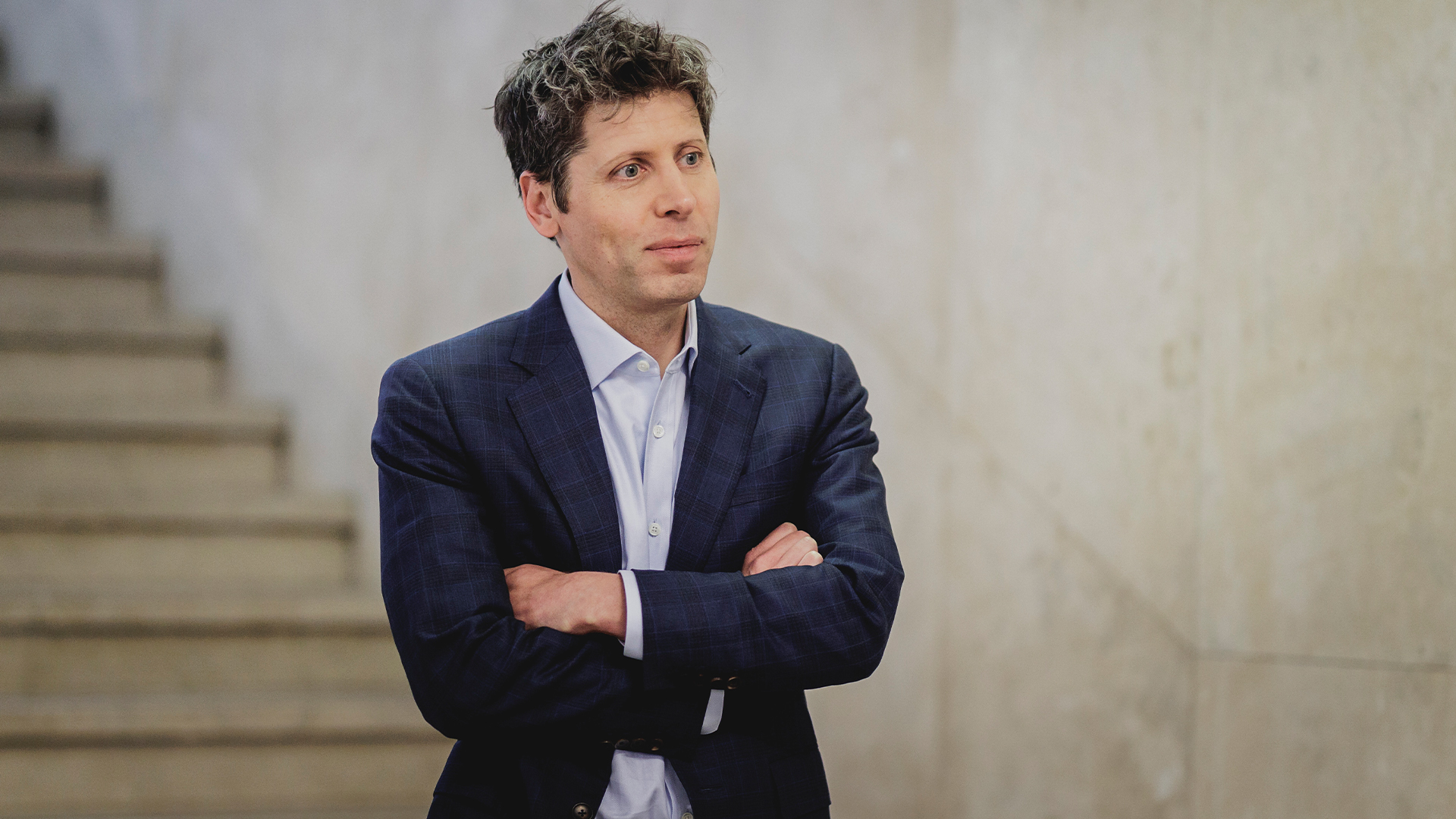"Do not sacrifice your entry-level jobs": Salesforce might be all in on AI, but it isn't giving up on junior workers yet – despite Marc Benioff's job replacement claims
Opportunities for graduates and junior workers will still be needed to maintain the skills pipeline, even as AI replaces workers


Sign up today and you will receive a free copy of our Future Focus 2025 report - the leading guidance on AI, cybersecurity and other IT challenges as per 700+ senior executives
You are now subscribed
Your newsletter sign-up was successful
Salesforce is still committed to hiring junior team members even as AI automates roles, according to UK&I chief executive Zahra Bahrololoumi.
Speaking to assembled press at Dreamforce 2025, Bahrololoumi addressed what she described as a universal fear and “orthodoxy” that AI will replace entry-level jobs.
Bahrololoumi stressed that this is not a Salesforce strategy in the UK or elsewhere and urged companies looking to eliminate junior roles with the technology to reconsider.
“Our message here is: do not sacrifice your entry-level jobs because you do need people that can work through that function, that process that can work alongside the AI to be able to manage and lead that composition of digital and human capital.”
Paul O’Sullivan, UKI CTO at Salesforce, said the firm is working closely with UK academic institutions such as Brunel University to plug skills gaps, noting that Salesforce is part of a UK government industry partnership that aims to train 7.5 million workers in AI skills by 2030.
“If companies eliminate entry-level hiring, they will not have the right skill profile to be able to orchestrate and manage the duality, or maybe the multimodality, that will be our future,” Bahrololoumi added.
Despite its efforts to expand AI skills and targeted hiring in the UK, Salesforce is elsewhere engaged in widespread job cuts driven by AI tools.
Sign up today and you will receive a free copy of our Future Focus 2025 report - the leading guidance on AI, cybersecurity and other IT challenges as per 700+ senior executives
CEO Marc Benioff has repeatedly emphasized that Agentforce and greater AI adoption would enable the firm to cut staff spending and reduce hiring across a range of areas, including customer support and even software engineering.
In September, he revealed that Salesforce has already reduced customer support roles by around 50% as a result of its own internal success with agentic AI tools.
Smaller firms use Agentforce to scale without staff
While Bahrololoumi and O’Sullivan emphasized that AI will empower rather than hinder the job prospects of graduates and junior workers, the duo also pointed to the potential benefits of the technology for smaller firms that can’t easily scale their workforce.
Bahrololoumi said Salesforce has seen a surge of interest, both globally but particularly in the UK, in its ‘commercial business’ category.
This is defined by Salesforce as enterprise customers that have $2 million or below in revenue. Growth across this category reached approximately 35% in Q1 2025, she explained, with double digit growth in Q2 and an expected 31% in Q3.
“I think it's interesting why we've seen this surge, because a commercial business or a mid-market business will not have the resources readily available to scale humans,” Bahrololoumi said.
“And yet they are growing because they're taking advantage of the technology that can enable them to grow and decouple that growth from headcount.”
As a result of this shift in interest, AI has actually increased hiring plans for Salesforce in its UK&I region, Bahrololoumi noted, as it now needs more sellers within the commercial business to meet demand.
AI isn’t affecting Salesforce hiring targets
Outside of this, Bahrololoumi revealed AI hasn’t reduced hiring targets but is changing the qualities sought in candidates. For example, certified engineers with experience and applied practice in generative AI are favored.
The same is true for many of its customers, she added, giving the example of a customer in private equity that won’t hire engineers for its portfolio company unless they have hands-on skills in the field.
In a separate panel at the event, Nathalie Scardino, president & chief people officer at Salesforce, explained that fresh graduates increasingly possess native digital and AI skills that lend themselves to career progression.
“We’re hiring a lot of AI natives,” said Scardino, explaining that Salesforce practices ‘reverse mentorship’ in which new graduates are paired with people throughout the organization such as forward-deployed engineers to share AI skills.
Salesforce onboarded around a thousand interns over the summer, Scardino added.
In addition to new hires, Salesforce is looking to equip its existing engineers with AI skills. O’Sullivan told attendees that this has been marked by a shift in focus over the past year.
“If we think about the existing community of engineers we’ve got, we're now being really prescriptive on carving out time to stay current, stay relevant,” he said.
Make sure to follow ITPro on Google News to keep tabs on all our latest news, analysis, and reviews.
MORE FROM ITPRO
- Marc Benioff is bullish on Salesforce’s agentic AI lead
- Salesforce just launched a new catch-all platform to build enterprise AI agents
- Slack is now the key to Salesforce’s agentic AI plans

Rory Bathgate is Features and Multimedia Editor at ITPro, overseeing all in-depth content and case studies. He can also be found co-hosting the ITPro Podcast with Jane McCallion, swapping a keyboard for a microphone to discuss the latest learnings with thought leaders from across the tech sector.
In his free time, Rory enjoys photography, video editing, and good science fiction. After graduating from the University of Kent with a BA in English and American Literature, Rory undertook an MA in Eighteenth-Century Studies at King’s College London. He joined ITPro in 2022 as a graduate, following four years in student journalism. You can contact Rory at rory.bathgate@futurenet.com or on LinkedIn.
-
 Salesforce targets telco gains with new agentic AI tools
Salesforce targets telco gains with new agentic AI toolsNews Telecoms operators can draw on an array of pre-built agents to automate and streamline tasks
-
 Four national compute resources launched for cutting-edge science and research
Four national compute resources launched for cutting-edge science and researchNews The new national compute centers will receive a total of £76 million in funding
-
 UK firms are dragging their heels on AI training – shadow AI means they need to move fast to avoid unauthorized use
UK firms are dragging their heels on AI training – shadow AI means they need to move fast to avoid unauthorized useNews With shadow AI rife, access to approved tools, clear guardrails, and training are needed to use the technology responsibly
-
 OpenAI's big enterprise push needs systems integrators, so it's turning to consultancies to plug implementation gaps
OpenAI's big enterprise push needs systems integrators, so it's turning to consultancies to plug implementation gapsNews Consultancies such as Accenture and Capgemini will act as systems integrators and help shape AI strategies for OpenAI customers
-
 Microsoft says fear of falling behind is driving an AI arms race among UK businesses – and it's fueling record adoption rates
Microsoft says fear of falling behind is driving an AI arms race among UK businesses – and it's fueling record adoption ratesNews New research shows AI is now a core part of UK business success strategies
-
 CEOs aren't seeing any AI productivity gains, yet some tech industry leaders are still convinced AI will destroy white collar work within two years
CEOs aren't seeing any AI productivity gains, yet some tech industry leaders are still convinced AI will destroy white collar work within two yearsNews A massive survey by National Bureau of Economic Research shows limited AI impact, but continued hopes it'll boost productivity eventually
-
 ‘AI is no longer about experiments. It is about results’: Boards are pushing for faster returns on AI investments, and tech leaders can't keep pace
‘AI is no longer about experiments. It is about results’: Boards are pushing for faster returns on AI investments, and tech leaders can't keep paceNews AI projects are now being held to the same standards as any other business investment
-
 AI isn’t making work easier, it’s intensifying it – researchers say teams are now facing 'unsustainable' workloads, cognitive strain, and higher levels of burnout
AI isn’t making work easier, it’s intensifying it – researchers say teams are now facing 'unsustainable' workloads, cognitive strain, and higher levels of burnoutNews While workers report productivity gains with AI, that means they’re faced with bigger workloads
-
 Business leaders are using AI as a “license to reduce headcount” – new Morgan Stanley research lays bare the impact on UK workers
Business leaders are using AI as a “license to reduce headcount” – new Morgan Stanley research lays bare the impact on UK workersNews Analysis of five sectors highlights an "early warning sign" of AI’s impact on jobs
-
 Lloyds Banking Group wants to train every employee in AI by the end of this year – here's how it plans to do it
Lloyds Banking Group wants to train every employee in AI by the end of this year – here's how it plans to do itNews The new AI Academy from Lloyds Banking Group looks to upskill staff, drive AI use, and improve customer service